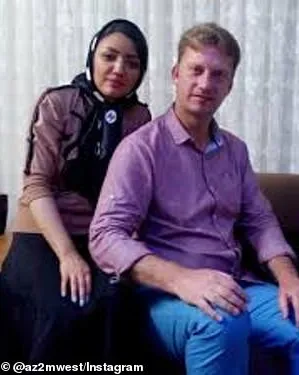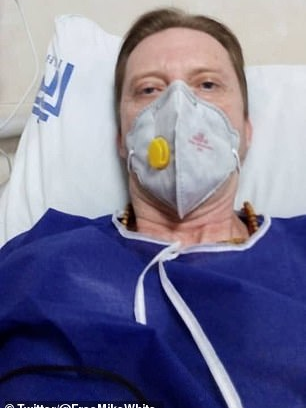How an Iranian dissident's kindness to a US prisoner earned him a new life

US Navy veteran Michael White's pursuit of love in Iran instead landed him in a Mashhad jail, where he looked destined to languish as a political bargaining chip.

US Navy veteran Michael White's pursuit of love in Iran instead landed him in a Mashhad jail, where he looked destined to languish as a political bargaining chip.
But the kindness of an Iranian cellmate allowed him to contact his loved ones, and Mehdi Vatankhah's risking of his own life ultimately earned him a new one in the United States.
I traveled to San Diego to chronicle the unlikely bond forged between two unfairly imprisoned men born a world apart but now forever united by solidarity and friendship.
At the border crossing between the United States and Mexico, a man with a tired face but a warm smile greeted me. Michael White, a former hostage in Iran, broke the ice with Iranian-style jokes and a few Farsi words. One of the first things he said was, “The Iranian regime is not like its people. Iranians are amazing. I love their culture. They deserve a better life.”
That sentence marked the beginning of the documentary I wrote and produced—one that follows the intertwined lives of two men: Michael White, an American hostage freed from Iranian prisons, and Mehdi Vatankhah, a young Iranian political activist. It’s a journey from solitary confinement cells in Mashhad to the open skies above California.
Michael, a Los Angeles native and a US Navy veteran, traveled to Iran in 2018 to meet a woman named Samaneh Abbasi, whom he had met in online chat rooms. But what began as a romantic trip soon turned into a nightmare.

On his third trip, he was arrested in Mashhad and sentenced to 10 years in prison on charges of “insulting the Supreme Leader” and “publishing private photos.”
He was taken to a secret detention facility run by the Ministry of Intelligence, where he endured harsh interrogations and torture aimed at forcing him to confess to espionage for the US and Israel. The pressure was so intense that he once attempted suicide.
After weeks in solitary confinement, he was transferred to Vakilabad Prison in Mashhad, where he shared a cell with Mehdi Vatankhah. Within those cold, gray prison walls began a bond that would alter both of their destinies.
Michael recalls that before his arrest, he had fallen deeply for Samaneh. He had first met her in Kish Island and was captivated by the kindness of the Iranian people and their culture. After returning to the US, his feelings only deepened. Determined to meet her family in Mashhad, he even converted to Islam in San Diego to remove any religious barriers.
But by the time of his third visit, Samaneh had told him she no longer wanted a relationship. Still, he hoped to meet her over lunch and propose formally. Instead, on his way to the meeting, three black vehicles intercepted him. His eyes were blindfolded, his head pushed down, and he was taken to an unknown location.
He was held in a surveillance-monitored room and only allowed out for interrogations—interrogations marked by shouting, threats, physical abuse, and sleep deprivation. His captors wanted him to confess which intelligence agency he worked for. At one point, the case prosecutor told him: “Six Iranian operatives are imprisoned in the U.S. You're the only American we can use for an exchange.”
Eventually, he was transferred to Vakilabad Prison, where he shared a cell with Vatankhah. Mehdi, a political prisoner with strong English skills, gradually gained Michael’s trust.
“The first time I saw him,” Mehdi recalls, “I could tell from the way he walked that he was seriously ill. He was wary of everyone. Later I learned that even his mother didn’t know where he was.”

In 2020, Mehdi was temporarily released. Using the information Michael had given him, he contacted Michael’s family and the US State Department. Until that point, US officials didn’t even know Michael was being held in Iran. Thanks to those efforts, Michael was able to meet with representatives of the Swiss Embassy in Tehran, which protects the US interests in Iran.
During the COVID-19 pandemic, Michael became ill. Iranian authorities, fearing the political fallout of his potential death in custody, transferred him to a safe house in Tehran.
On June 4, 2020 (15 Khordad 1399), Michael was exchanged for Majid Taheri, an Iranian American physician who had been jailed in the US for violating sanctions. Notably, Taheri chose not to return to Iran after his release and remained in the United States.
Then-President Donald Trump tweeted, “I will never stop working to secure the release of Americans held hostage overseas.” He thanked both the Swiss government and Iran for facilitating the exchange, saying it proved “a deal is possible.”
But Iran’s history of hostage-taking goes far beyond Michael’s case. From Nizar Zakka and Jason Rezaian to Siamak Namazi—and today, the French couple Cécile Kohler and Jacques Paris, now in their third year of detention—the pattern remains: arrests used as political leverage. In reality, Iran has proven that negotiating with it is far from easy.
Michael’s mother released a statement after his freedom: “During the 683 days my son was held hostage by Iran’s security forces, I lived in a nightmare.”
Yet the story didn’t end there. In prison, Michael had promised Mehdi that if he were ever freed, he would help him achieve his dream of becoming a pilot. With Michael’s legal support, Mehdi was granted entry into the United States through a humanitarian parole program. Today, he lives and flies in San Diego.
On one of his first flights, I sat beside him in the tiny cockpit of his light aircraft. When I asked how he felt looking back, he simply said, “It all feels like a nightmare… a nightmare I’ll never forget.”
But the scars Michael carried from Iran went beyond prison and torture: “Betrayal, heartbreak, unanswered questions. “He still drifts into silence whenever he hears Samaneh’s name, staring off and murmuring, “I don’t know why it happened. I was just in love with her.”
When I asked if he believed Samaneh was an agent, he didn’t answer directly. He only said, “Samaneh was like many Iranians. Outside, she wore a hijab, but inside her home, she and her family were just like Americans—like so many Iranians.”
Michael still insists: “The Iranian people don’t deserve this regime. They’re good people who deserve freedom and a better life.”
Perhaps Michael’s story has ended. But what the Islamic Republic has been targeting for years goes far beyond one man or one nation. It is humanity itself: human connection, freedom of speech, the right to live. And not just for Iranians—for anyone who dares to step onto its soil.